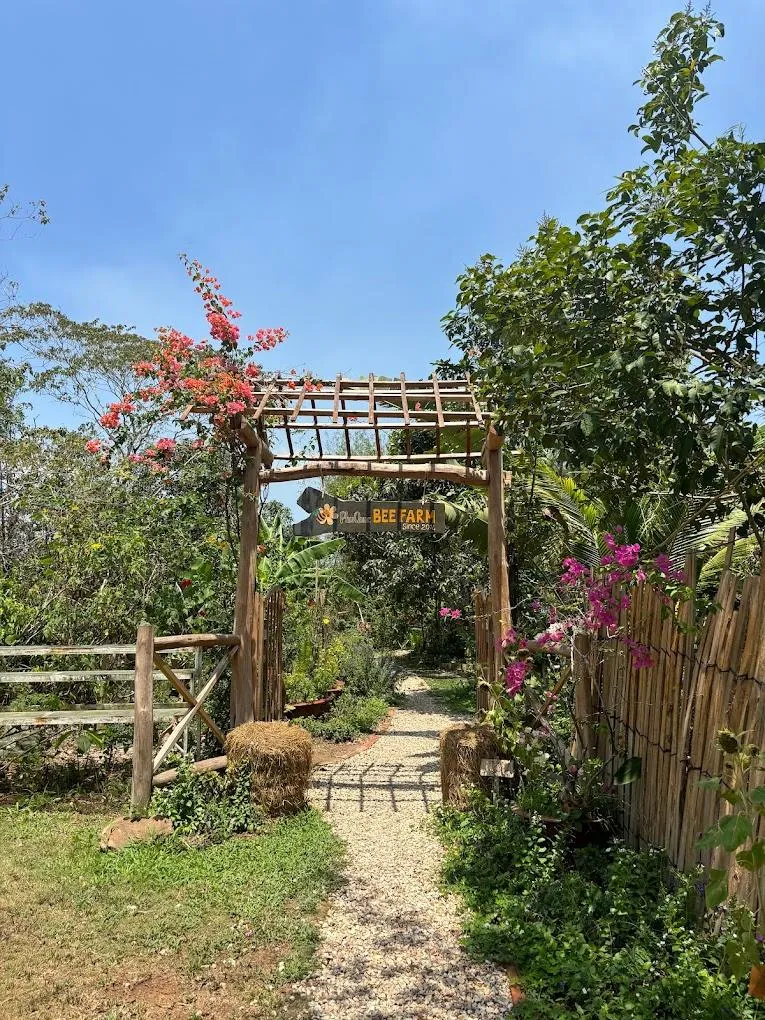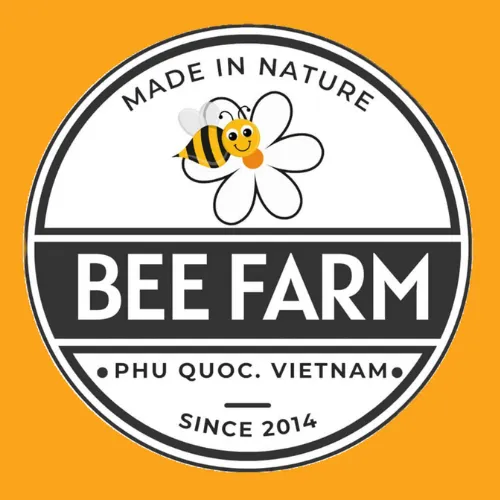Our Story
Phu Quoc Bee Farm: Where Nature, Education, and Sustainability Meet

Getting Started
Founded in 2014, Phu Quoc Bee Farm is the first eco-tourism destination on Phu Quoc Island where visitors can learn about the fascinating life of honey bees. At that time, Phu Quoc had limited attractions, particularly in the eco-tourism space, so we set out to create a farm that combines education with sustainable tourism.
The Farm and Bees
Our farm spans 4,000 square meters, nestled in the lush southern countryside of Phu Quoc. It features a tropical garden with a lake and fruit trees such as durian, rambutan, mango, avocado, jackfruit, and mangosteen. Depending on the weather, we manage between 20 and 60 hives, with the main bee species being Italian honey bees. Additionally, we preserve native Phu Quoc bees, including black and red honey bees. We’ve also partnered with surrounding landowners and other bee farms to expand habitats and honey production.


Visitor Experience
We officially opened to visitors in May 2015. Visitors can enjoy free tours, where they learn about the life cycle of honey bees, explore the structure of a beehive, and sample fresh honey. In the summer, guests are invited to taste ripe tropical fruits directly from the garden, such as rambutan, mango, and jackfruit.
100% Sustainable
At Phu Quoc Bee Farm, sustainability is a core value. In addition to our honey, we produce eco-friendly items such as beeswax candles, soap, and antibacterial food wraps made with reusable beeswax. These products are part of our commitment to reduce plastic waste and promote green living.


Environmental Education
For nearly a decade, we have strived to make Bee Farm a green destination by using natural materials like bamboo straws, banana leaves, and glass bottles. One of our most impactful efforts is our educational program to raise awareness about the importance of bees, nature’s most crucial pollinators. To date, we have hosted field trips for over 800 local students, teaching them about bees and the environment.
We also advocate against buying honey harvested from wild bees, which causes harm to millions of pollinators and damages ecosystems. Our message is clear: over two-thirds of the food people eat is the result of bee pollination, making their protection vital.
Recognition and Future Plans
In 2020, we were honored to receive the Traveler’s Choice certification from TripAdvisor for our commitment to eco-tourism. Although the COVID-19 pandemic forced us to close from 2021 to 2023, we reopened in December 2023 with renewed focus and dedication.
Moving forward, we will continue developing beeswax food wrap products to reduce plastic consumption and work with schools to create bilingual educational programs about bees and environmental protection. We hope to see the conservation of native honey bees emphasized more in both media and school curriculums in the coming years.

testimonials



Elena Mitterhofer

Amazing place in the North West of Phu Quoc! The owner was lovely and gave us an informative tour of the farm. Drinks and food were also excellent. Definitely worth visiting!



Anna Caston

Brilliant and interesting place to visit. Raw honey to try in different flavours. Delicious smoothie at the cafe afterwards. Friendly family run place



Chu Ou

This place is free to visit, just buy some drinks, food, or souvenirs. I was given a small tour about their cute farm. So many interesting facts about honey bees
Frequently Asked Questions
What can visitors expect during a visit to Phu Quoc Bee Farm?
Visitors can enjoy a free guided tour through our tropical garden, where they’ll learn about the life of honey bees, explore beehives, and see how honey is made. Depending on the season, guests can also taste fresh fruits like rambutan and mango, grown right on the farm. Additionally, we offer a range of eco-friendly bee-related products, such as honey, beeswax wraps, candles, and more.
Is Phu Quoc Bee Farm open year-round?
Yes, Phu Quoc Bee Farm is open year-round except for Wednesdays. Our hours are 9 AM to 5 PM. Please note that during certain seasons, the number of active bee colonies may vary depending on weather conditions, but we always have plenty to show and share with visitors.
How does Phu Quoc Bee Farm contribute to environmental sustainability?
We are deeply committed to sustainability by using eco-friendly materials such as bamboo straws, banana leaves, and glass bottles. We also create products like beeswax food wraps to reduce plastic waste. Additionally, we run educational programs for both tourists and local students to raise awareness about the critical role honey bees play in pollinating crops and protecting the environment.
